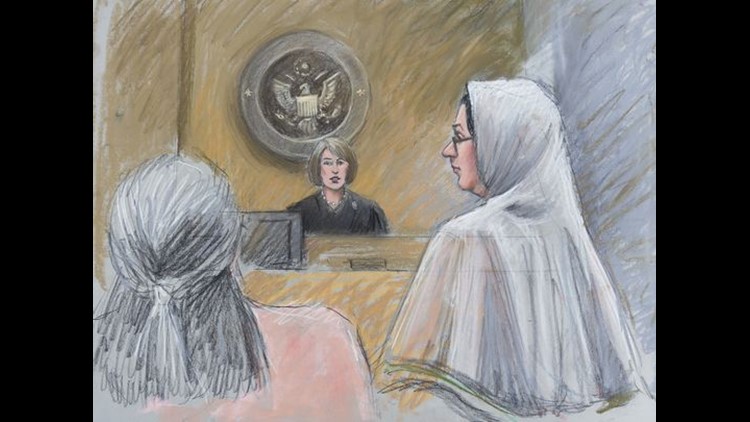In a major blow to the government, a federal judge in Detroit has declared the nation's female genital mutilation law as unconstitutional, thereby dismissing nearly all of the charges against two Michigan doctors and seven others accused of subjecting at least nine minor girls to genital cutting in the nation's first FGM case.
The historic case involves minor girls from Michigan, Illinois and Minnesota, including some who cried, screamed and bled during the procedure and one who was given Valium ground in liquid Tylenol to keep her calm, court records show.
U.S. District Judge Bernard Friedman concluded that Congress did not have the authority to pass the 22-year-old federal law that criminalizes female genital mutilation in America. FGM is banned worldwide and has been outlawed in more than 50 countries, though the U.S. statute had never been tested before this case.
Friedman's ruling stems from a request by Dr. Jumana Nagarwala and her co-defendants to dismiss the genital mutilation charges, claiming the law they are being prosecuted under is unconstitutional.
More specifically, the defendants have argued that “Congress lacked authority to enact" the genital mutilation statute, "thus the female genital mutilation charges must be dismissed.” They also argue that they didn't actually practice genital mutilation, but rather engaged in a benign religious ritual that involves only a scraping of the genitals.
The statute at issue states: "Whoever knowingly circumcises, excises or infibulates the whole or any part of the labia majora or labia minora or clitoris of another person" under the age of 18 shall be fined or imprisoned for up to five years, or both.
Prosecutors argue Nagarwala, the lead defendant, did exactly that when she cut the genitals of two 7-year-old Minnesota girls who were tricked into the procedure in 2017 by their mothers and cried and bled afterward. They said Nagarwala did this with the help of Dr. Fakhuruddin Attar, who is accused of letting Nagarwala use his Livonia clinic after hours to carry out the procedures; and his wife, Farida Attar, who is accused of assisting Nagarwala in the examination room during the procedures and holding the girls' hands.
Prosecutors allege that Nagarwala may have subjected up to 100 girls to the procedure over a 12-year period, though they have cited nine victims in the case: two 7-year-old girls from Minnesota; four Michigan girls ages 8-12, including one who was given Valium ground up in liquid Tylenol during her procedure; and three Illinois girls.
Nagarwala has maintained she committed no crime and is being prosecuted under a law that slid through Congress without proper vetting.
“The law was never debated on the floor of either chamber of Congress nor was there ever any legislative hearing addressing the justification or need for the federal law. Instead, all that exists is the criminal statute itself,” defense lawyers have argued in court documents, claiming the driving force behind the legislation was one lawmaker's belief that the prohibited conduct was 'repulsive and cruel.' "
But the Constitution demands more than that, the defense has argued, claiming Congress could not have passed a female genital mutilation ban under the Commerce Clause because "notably, here, the activity being regulated has absolutely no effect on interstate commerce."
The prosecution disagrees, arguing genital mutilation is an illegal, secretive and dangerous health care service that involves interstate commerce on a number of fronts: text messages are used to arrange the procedure; parents drive their children across state lines to get the procedure; and the doctor uses medical tools in state-licensed clinics to perform the surgeries.
In defending the statute, prosecutors also have noted that FGM is condemned worldwide -- it's illegal in more than 30 countries. And they've cited the legislative history of the law, along with U.S. Senator Harry Reid's comments in pushing for a genital mutilation ban.
“I want everyone within the sound of my voice to understand that what I am going to talk about here today does not deal with religion and it does not deal with sex. It deals with violation of a person’s human rights. It deals with degradation of women and young girls. It deals with the most inhumane thing a person can imagine,” Reid stated in 1994.
On September 30, 1996, the female genital mutilation law was signed, with Reid stressing: “There is no medical reason for this procedure ... It is used as a method to keep girls chaste and to ensure their virginity until marriage, and to ensure that after marriage they do not engage in extramarital sex.”
The female genital mutilation statute carries a maximum punishment of five years in prison. The defendants, meanwhile, also face up to 20 years in prison on obstruction of justice charges, if convicted.
The most serious charge against Nagarwala — conspiracy to transport a minor "with intent to engage in criminal sexual conduct" — carries a maximum life sentence.
Four mothers also have been charged, accused of subjecting their daughters to the unlawful procedure.
The defendants are all members of a small Indian Muslim sect known as the Dawoodi Bohra, which has a mosque in Farmington Hills. The sect practices female circumcision and believes it is a religious rite of passage that involves only a minor "nick."
The case is set to go to trial in April 2019.
Tresa Baldas: tbaldas@freepress.com. Follow her on Twitter @Tbaldas



